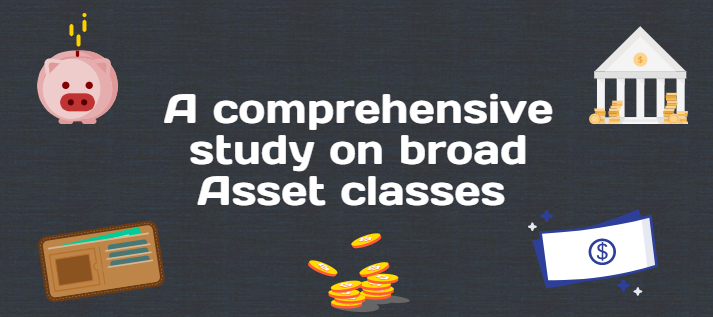A comprehensive study on broad Asset classes
The investment option basically comprises of different combination of asset classes where each of it has its own set of behaviour and have some unique properties. Before we dig deeper into the topic, let’s quickly understand the meaning of asset class.
Asset class
An asset class is a specific category of investments or assets based on its unique properties which includes property, cash, shares, etc.
While there is no standard list of asset classes as such but it can be broadly categorised into the following 5 heads-
1.Fixed Income
2. Equity
3. Commodities
4. Real Estate
5. Cash
Any financial product you come across will fall into any of these 5 asset classes only. Our investment avenues are made up of different combinations of asset classes. Understanding their key features can help you make wise investment decisions.
Classification of various Asset classes
1. Equity
Equity is very interesting asset class and slowly getting more and more acceptance since last 1-2 decades. Investing in equity implies that you have bought ownership into a business. For instance, when you buy stocks of Tata Steel, you become a part owner of that business and you receive a percentage ownership. So if the company grows in future, then the net worth of your business also grows.
But one problem is that equity investment works in long run and in between there may be lot of ups and downs which gets reflected in company’s stock price. Hence patience is a key here.
People often refrain from equity
Equity returns are very volatile in nature hence most of the people refrain from investing into direct equity or mutual funds investment, but they are proven as real wealth builders for long term investors. There are mutual funds from different Asset management companies which have proven track record for building wealth for its investors.

2. Fixed Income
Fixed income is an asset class which pays regular income in the form of interest payment, coupon payment or preferred dividend. It is the most famous and favourite asset class amongst Indians since the investment amount is more or less protected and the returns are either fixed or predictable to a much extent.
Fixed income investment is like lending your money to someone with assurance of receiving pre-defined return. So when you do a fixed deposit in a bank, it’s not investing rather it’s like giving a loan or simply lending your money with the promise of getting it back along with a pre-defined interest.
Fixed Deposits do not beat inflation
Even if you are getting 7-8% return on your fixed deposits, most people do not realize that it’s the pre-tax return. Since fixed deposits are taxable (rather every other debt instrument), so once the taxes are paid on the returns, the post tax returns come down to about of 5-6%. When you adjust the inflation of 8-10%, have you realised that you are actually getting a negative return on your fixed income investments.
3. Real Estate
Real estate simply refers to physical space, or structure like residential flats, land, commercial spaces etc which are either used for living purpose or for doing the business and generate income
Real estate is cyclical in nature
Real estate market has moves in cycles of ups and downs and the returns can be highly volatile and which often depend on various factors like government policies, political situations, city future and many more.

4. Commodities
Commodities refer to different types of physical goods or products which can be bought and sold for various uses. Some of the very common examples include Oil, Gold, Silver, Rice, etc. Demand and supply plays a key role in pricing of these products.
Commodities are meant for “Trading” and not for investing
Most commodities are not for long term investments, but mostly for trading purpose, where you can benefit from the market cycles and predict demand and supply moves and get a profit or loss.
Returns from the commodities can be very volatile which can greatly vary since each commodity has its own market and dynamics.
Some of the commodities like Gold or Silver can be invested for a very longer period because they can be stored without losing their usage. Other commodities can’t be stored in the same way thus trading them for short term is a feasible option.
5. Cash
Cash doesn’t just mean the hard cash, but also the money there in your liquid mutual funds or saving bank account. The good thing about cash is that it gives you freedom to “buy” anything you want instantly and this is one important reason why most of the people prefer to hold cash.
Conclusion
Instead of just holding any one asset class, you may diversify your fund among the above discussed asset class which also reduces your overall risk. Moreover based on your risk, time frame and market cycle, you may choose to switch from one asset class to another.
Tag:Cash, Commodities, equity, gold, investing, real estate, Trading


